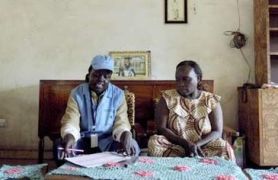South Sudan census enumerators face challenges
By James Gatdet Dak
April 24, 2008 (JUBA) – Enumerators of the 5th population and housing census exercise which kicked off on April 22, have been facing a number of challenges across the country particularly in Southern Sudan.
 The challenges range from insecurity, contested boundary lines between Counties, lack of mobility and unfriendly rainy weathers in many parts of Southern Sudan.
The challenges range from insecurity, contested boundary lines between Counties, lack of mobility and unfriendly rainy weathers in many parts of Southern Sudan.
Rains are reported to have made it difficult for the census exercise in Upper Nile state because of poor roads during rainy season.
Insecurity issues have hampered the work of enumerators in northern Rumbek of Lakes State while Western Equatoria and Northern Bahr el Ghazal states have contested County boundaries within their respective states.
Some enumerators in Lakes state yesterday were caught in attacks carried out by Dinka Luach section in Kak Payam in which twelve boxes full of census forms were reported to have been burnt to ashes along with money carried by the enumerators.
In northern Bahr el Ghazal state, the administration of Aweil East County has confiscated the census forms accusing the enumerators of cutting off part of their County in the census map.
In Southern Kordufan state, the SPLM chairman and Deputy Governor in the state, General Kodi issued a statement ordering the party members in the state to boycott the census exercise, citing insecurity as the main reason behind his decision.
In a number of Internally Displaced Persons (IDPs) camps in Darfur, enumerators were confronted by protestors in rejection of the census exercise in some parts of the region resulting into death of two persons in Kelma IDPs camp, north of Nyala.
A number of Southern Sudan state governments have already complained that the numbers of enumerators in their respective areas are not enough to count all the households or reach all corners of their states.
The other source of complaint is that Greater Upper Nile and Greater Bahr el Ghazal regions where most of their respective populations speak and write Arabic were provided mostly with census questionnaire forms in English language while Greater Equatoria region was provided with forms written in Arabic contrary to its population that mostly speaks and writes English language.
The Chairperson of the Southern Sudan Center for Census, Statistics and Evaluation Commission, Mr. Isaiah Chol Aruei appealed to citizens in Southern Sudan to be patient and cooperate with the census enumerators.
He explained to the press that despite the challenges facing the exercise his team would work hard to make sure that the exercise is successful throughout the region.
The exercise will last for fifteen days from April 22, to May 6, 2008.
Earlier, the First Vice President of the Republic of Sudan and President of the Government of Southern Sudan, General Salva Kiir Mayardit, appealed to the people of Southern Sudan to make sure they are counted in the census.
President Kiir was the first person to be counted by enumerators at his residence in Juba in the early morning on Tuesday, April 22 during the kick off of the population and housing census.
In a statement to the press while his household was being counted, President Kiir however expressed his disappointment over the conduct of the census despite the resolution passed by his government in the South to defer the exercise to a later date during the year.
In that resolution No. 95/2008, the Government of Southern Sudan demanded, among others, that more than two million Southern Sudanese IDPs in the north be repatriated to the South to participate in the count as part of Southern Sudan population, complete demarcation of the north-south borderline, and include ethnicity and religion in the census questionnaire form as well as avail sufficient funds for maintenance of security in the South before any census exercise could take place.
None of these demands were met by the Government of National Unity in Khartoum and particularly the Presidency.
Kiir blamed the National Congress Party for the Presidency’s decision in Khartoum to carry out the census at this particular time.
The population and housing headcount is in line with the implementation of the Comprehensive Peace Agreement (CPA) signed on January 9, 2005 in Nairobi, Kenya.
The results of the Census according to the CPA shall be used to review and re-calculate the current power and wealth sharing between northern and southern Sudan so that it is based on the actual size of population in each region.
The results will also be used as a basis for distribution of political constituencies in the country before next year’s general elections in the country.
The Government of Southern Sudan warned it would not be bound by the results of the Census which it described as lacking the required conditions for its conduct to succeed in the South.
(ST)

Deng
South Sudan census enumerators face challenges
Any person with reasonable commonsense has anticipated the challenges of census, even Salva himself new this, but he seems to be out of touch with really. He is leader that can be fooled and manipulated, he gave on issues that are critical to South Sudan.
What a very foolish, coward, and irrational person, he has no vision. Salva’s daily reasoning is proving to people that he is incapable person, shame on you and God damn you Salva for constantly making bad decision and putting South Sudanese in risk.
Ahmed Chol
South Sudan census enumerators face challenges
Bashir delayed the census in February because it is clear tactic and calculation of Khartoum to gain all the advantage over southerners during the rainy season. Much of our population is in rural areas, far away from towns and roads. It is difficult for the enumerators to access them. This on going difficulty could have been easily avoided. One wonders how long Salva will rule that way…
Ahmed Chol